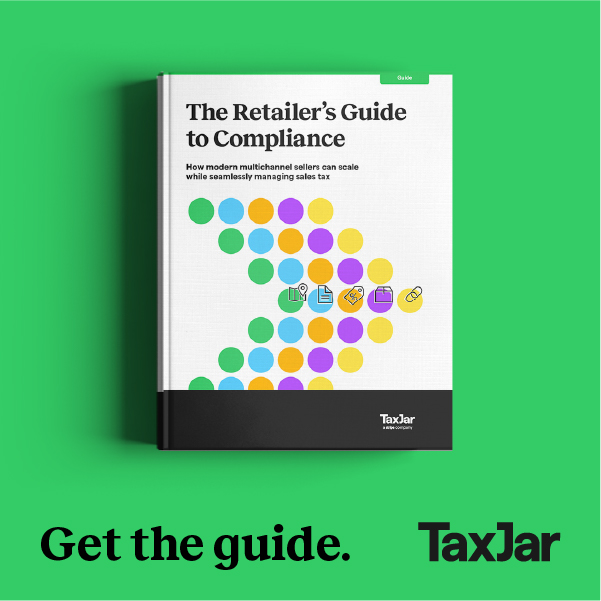Five sales tax myths dispelled
by January 1, 2025
We talk to TaxJar customers and other people curious about sales tax every day. When you talk to so many people, you start to notice recurring themes, and one of those themes are “sales tax myths.” These are the rumors and misconceptions that seem to crop up over and over again. And we get it, sales tax is complicated. And it isn’t always intuitive.
Sales tax myth #1: I paid sales tax when I bought an item, so I don’t need to charge sales tax when I resell it
Not so fast. If you’re selling a taxable item to a buyer in a state where you have sales tax nexus, then you need to charge sales tax on that transaction even if you paid sales tax when you bought the item.
It helps to think of sales tax as a tax on the transaction rather than a tax on the item.
Luckily, there are a couple of ways to keep from having to pay sales tax on items you buy for resale. You can present a resale certificate when you buy or you can attempt to recover the sales tax you paid later. Here’s a blog post from CPA Ned Lenhart about recovering sales tax you paid on an item you intended to resell.
Sales tax myth #2: I didn’t make any sales, so I don’t need to file a sales tax return
When you’re issued your sales tax permit, your state will also issue you a filing frequency. This is normally monthly, quarterly or annually. Your state expects to hear from you on that due date whether or not you collect sales tax.
States consider your sales tax filings a sort of a “check in” to let them know you’re still in business – even if you took the quarter off and didn’t collect any sales tax from buyers over the taxable period. The return you file when you don’t have any sales tax to report or pay is often referred to as a “zero return.”
The way states handle not hearing from you varies. Florida is harsh – they’ll assess a $50 penalty for failing to file a zero return. (Though we’ve heard of sellers calling the state’s department of revenue and successfully having this penalty waived!) California, on the other hand, won’t fine you but if you continue to fail to file zero returns they may send you notices or even go ahead and cancel your sales tax permit. While this isn’t the end of the world, it would necessitate the chore of contacting the state and reinstating your permit.
Sales tax myth #3: I charge sales tax based on the rate at my location
This is one of those myths that is sometimes true, but a whole lot more complex than we’d like it to be. If you are an eCommerce seller based in a state with an origin-based sales tax, then yes, you do charge sales tax based on the sales tax rate at your location. But only a few states are origin-based so most sellers have a harder time of it.
But if you’re an eCommerce seller and live in a state with a destination-based sales tax, then you’d charge sales tax based on the ship-to location of the buyer.
Things get even more complicated if you have nexus in a state other than your home state. For the most part, you’d charge sales tax based on the buyer’s ship destination in those states, too. You can find out a whole lot more about what sales tax rate to charge your buyers here.
Sales tax myth #4: This seller isn’t located in my state, so they can’t charge me sales tax
We sometimes get questions from eCommerce buyers who are concerned that they were erroneously charged sales tax. This often comes after they’ve seen that the seller shipped them a package from another state.
Example: “I live in North Carolina but my package shipped from Maryland. Why was I charged sales tax?”
The fact is, companies can have sales tax nexus in a state for many reasons. Maybe they have a store, a warehouse or an employee there. “Ship from” location can be totally irrelevant. Companies can even choose to comply with sales tax laws and collect sales tax in states where they don’t currently have sales tax nexus. (States are broke and totally fine with anyone collecting sales tax revenue for them, believe me!)
Do you still think you may have been charged sales tax in error? You can always contact the seller to double check. As we all know, sales tax is complicated and sellers can easily make a mistake. Most sellers are more than willing to either offer an explanation on why you were charged the amount of sales tax you were charged or refund the amount charged if a mistake occurred.
Sales tax myth #5: My Amazon inventory gave me nexus in this state. So I only have to collect sales tax from Amazon buyers in that state
Here’s how this myth usually plays out. Our seller, Jo, lives in Illinois and sells on eBay. She has decided to branch out and begin selling using Amazon FBA. Once Jo begins selling on FBA she finds out that she has sales tax nexus in 5 additional states where her FBA inventory is stored. So Jo registers for her sales tax permits in all the states where she has nexus, and she sets up sales tax collection through Amazon (and only Amazon). Did you spot the problem?
Jo forgot that nexus is nexus, no matter what platform you sell on. So even though selling through Amazon FBA gave Jo nexus, she is still required to collect sales tax from buyers on all the platforms on which she sells. So Jo would need to collect sales tax from her Amazon buyers but also from her eBay buyers in those nexus states. And if Jo ever decides to branch out and sell on her own website through Shopify she’d need to collect sales tax from her buyers in all the states where she has sales tax nexus.
To sum it up: once you have nexus in a state, charge sales tax to all buyers in that state.
Sales tax myth #6: If I live in an “origin-based” sales tax state then I only have to collect sales tax from buyers in my state
Just like anything involving sales tax, states make their own laws. So if a state requires you to charge sales tax using “origin-based” sourcing, that law only applies to that particular state. Let’s look at an example:
Shannon lives in Tennessee, which is an origin-based state. The sales tax rate at her home workshop from where she sells handmade furniture is 9%. Since Shannon has home state sales tax nexus in Tennessee, and the furniture she sells and ships to her customers is taxable, then she is required to collect sales tax from her buyers located in Tennessee. And because Tennessee is an origin-based sourcing state, she only has to charge that 9% sales tax rate to all of her customers. Unlike other sellers who live in destination-based states, she does not have to worry about figuring out what the sales tax rate is at each buyer’s ship-to location.
But, let’s say Shannon opens a furniture factory in neighboring Arkansas. She now has sales tax nexus and is required to collect sales tax in both Arkansas and Tennessee. Shannon now has sales tax nexus in Arkansas, too. She’s required to register for an Arkansas sales tax permit and begin collecting sales tax from her Arkansas customers. Contrary to this myth, just because Shannon lives in an origin-based state does not mean that she only has to collect sales tax in her state. If Shannon has sales tax nexus in other states, she has to follow those other states’ rules and collect sales tax the way they want her to collect.
This brings me to the next, related myth:
Sales tax myth #7: If I live in an origin-based sales tax state, I charge everybody all around the world the sales tax rate at my business location
In this myth, once again sellers overlook the fact that every state makes their own sales tax laws and rules, and that every state is different.
Shannon lives in Tennessee, and so when collecting sales tax from a buyer in Tennessee she follows Tennessee sales tax law. That means charging sales tax at the 9% rate of her home workshop.
But Shannon should not charge buyers in other states the Tennessee sales tax rate. If she has sales tax nexus in another state, then it’s up to her to also follow that state’s sales tax laws.
Sales tax myth #8: If Amazon collects sales tax from buyers in a state, then I have to collect sales tax from buyers in that state
Just like any other eCommerce seller, Amazon.com is required to collect sales tax in states where it has nexus.
Amazon FBA sellers are also required to collect sales tax in states where they have nexus. The mistake lies in thinking that Amazon and Amazon FBA sellers have the same sales tax collection requirements.
When you see a news story about Amazon collecting sales tax in a new state, keep in mind Amazon may have nexus there for any number of reasons, such as having employees, offices or data centers in the state.
Amazon FBA sellers only have to be concerned with nexus in states where their inventory is stored (or where other business factors create nexus). So just because Amazon.com collects sales tax from buyers in North Carolina (home to an Amazon sort center), does not mean that Amazon FBA sellers also are required to collect sales tax from buyers in that state. As an FBA seller, you are only required to comply with sales tax laws and collect sales tax in states where you have sales tax nexus. Amazon.com’s sales tax nexus has nothing to do with your sales tax nexus.
It helps to think of your FBA business as totally separate from Amazon.com’s business. This brings me to the next myth:
Sales tax myth #9: I have sales tax nexus in every state where Amazon has a fulfillment center
We all know that storing inventory in a state creates sales tax nexus (with the big exceptions of New York and Virginia who don’t consider 3rd party fulfillment to create nexus.) We’ve had brand new Amazon FBA sellers ask us if they should immediately register to collect sales tax in all approximately 20 states (and growing) where Amazon has a fulfillment center. Our advice is usually the same – hold your horses!
Just because Amazon has a fulfillment center in a state does not mean that your inventory is stored in that state.
There are a couple of good ways to find out where your inventory is actually stored:
- Check your Inventory Event Detail Report on Amazon – this is Amazon’s report showing you exactly where your products are sitting
- Check your TaxJar dashboard – TaxJar will indicate states from where Amazon is shipping your inventory with a brown Amazon badge.
We did some number crunching last year, and found that most established Amazon sellers had inventory stored in about 10 states. While that average may very well have changed at this point as Amazon expands their fulfillment network, chances are you don’t have inventory stored in every Amazon state. We recommend double checking where your inventory is actually stored before registering for a sales tax permit.
Sales tax myth #10: If I use Amazon inventory placement, I can limit the states where FBA gives me sales tax nexus
Amazon Inventory Placement is a program that allows Amazon FBA sellers to pay a fee to send shipments to just one warehouse, rather than sending them to multiple warehouses.
Unfortunately, after investing further, we found that Amazon Inventory Placement does not seem to have any bearing on the number of states where your Amazon products eventually end up. Basically, while sending shipments to just one location can make your life as a seller much simpler, Amazon will still trans-ship your products to wherever they are most needed – and that usually means dispersing them to different states. After all, Amazon has proven time and again with their actions that they are attempting to build the fastest delivery network out there.
While it would be great to be able to limit your sales tax liability when using Amazon FBA, this myth is busted.








